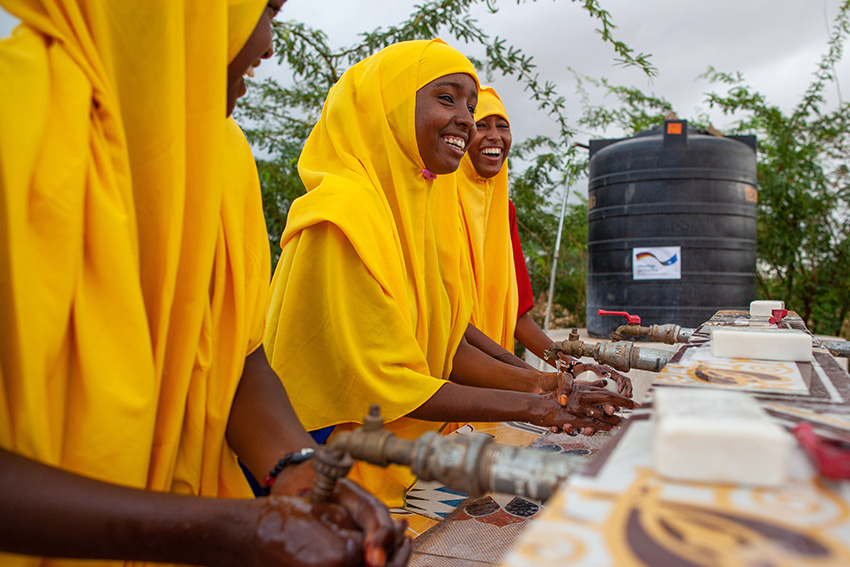
Photo Credit: Mark Naftalin/UNICEF
Contributors: Henry Omara, Ibrahim Abali, Kenneth Otieno Awuor, Washabiah Chagwa, Peter Gottart, Aeorangajeb Al Hossain and Julia Rosenbaum, FHI 360
As FHI 360 marks its 50th anniversary, explore our history of solutions and future of possibilities.
For years, hand hygiene was a neglected issue within the broader water, sanitation and hygiene (WASH) sector — until COVID-19. During the pandemic, public health messaging has re-emphasized the importance of handwashing and contributed to gains in more people practicing better hand hygiene. But now, we are seeing signs of fatigue and handwashing rates have begun to drop. As the pandemic continues, there is an urgent need to ensure that these gains are not lost. We must create a new normal, one in which hand hygiene is a mainstay in public health interventions. There are three ways to ensure that healthy handwashing behaviors outlast the pandemic.
1. Recognize the crosscutting benefits of hand hygiene.
FHI 360 has integrated hand hygiene interventions into several projects, including the Integrated Humanitarian Assistance to Northeast Nigeria III project — which addressed cholera in northeast Nigeria — and the WASHplus project — which reduced school absenteeism in Zambia. By understanding the correlation between hand hygiene and other development outcomes and by embedding hand hygiene into multiple sectors, we can show a crucial contribution to broader global development goals and attract needed attention and funding.
2. Build on the best practices of behavior change.
While hand hygiene is a seemingly simple practice (it only takes 20 seconds!), people can face barriers to washing their hands frequently and effectively. FHI 360 is a pioneer in the science of forming handwashing habits. We know that the key to sustaining hand hygiene practices relies on addressing social determinants and other behavioral motives, such as the influence of a person’s external environment (nurture) and a person’s sense of belonging (affiliation).
In eastern Democratic Republic of the Congo, FHI 360 supported handwashing in public marketplaces and transport stations by increasing access — a key behavioral determinant — through installing conveniently placed handwashing stations and mobilizing the community to maintain them. To sustain hand hygiene behavior, we must recognize the range of behavioral determinants for handwashing and build on habit-forming principles.
3. Invest in inclusive, locally led programs.
FHI 360 hosts the Global Handwashing Partnership, which plays a key role in the Hand Hygiene for All Initiative. The initiative supports countries in developing their costed national roadmaps (action plans that are incorporated into national budgets) for universal hand hygiene. Pakistan is an early champion of this type of national commitment, and their country roadmap is a model of an approach that activates the local system. By mobilizing local markets, supply chains, policies and resources, countries can generate more innovative, sustainable and community-specific solutions to barriers to hand hygiene.
The COVID-19 pandemic catalyzes us to reimagine how we approach hand hygiene as a public health intervention. Lessons from the past year show that we must continue employing innovative, 360-degree approaches to solidify healthy handwashing habits globally. Let us meet the urgency of this moment and work to accelerate our progress toward hand hygiene for all.

Very informative post. Great info for project design specialists and project managers.